Do you have a fun historical fact that you want us to share? Let us know!
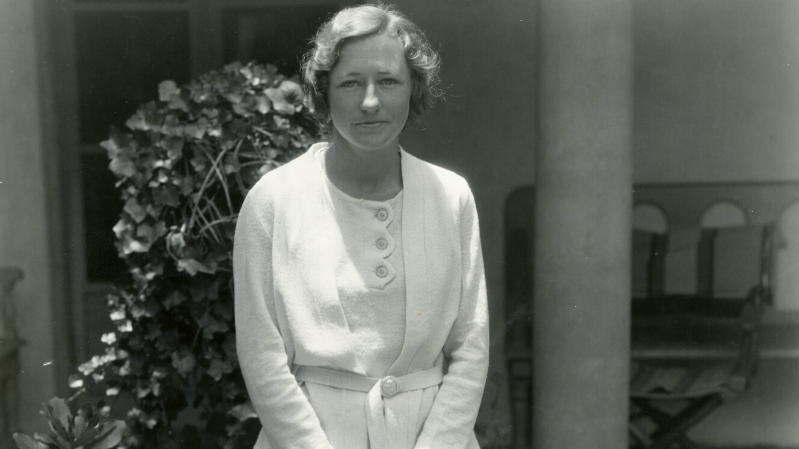
Did you know that Ada Watkins Hatch ’31 was the first student enrolled at Scripps College in 1926? Ada remained close to the College after graduation, serving as a trustee for five years, and regularly attended Reunion Weekend. Ada later went to Columbia University for her master’s in nursery school education, a new field at the time. While attending her fifth reunion she reconnected with Caltech engineer, Bill Hatch. They married and raised three daughters in rustic Twentynine Palms. She inspired one of her daughters, Martha Hatch Reich ’71, and granddaughter Angela Meyer O’Connor ’91 to also attend Scripps.

Did you know that the olive trees at Scripps College were originally cared for by the Martinez family when the college was founded in 1926? Daniel and his wife Guadalupe (pictured here) used to harvest olives from the campus olive trees for their family through the Great Depression. Daniel and his cousin Jesus Soto also built masonry walls on campus and cared for the buildings of the Claremont Colleges. Photo courtesy of Nancy Neiman, Department of Politics Chair and Professor of Politics. More Scripps facts.
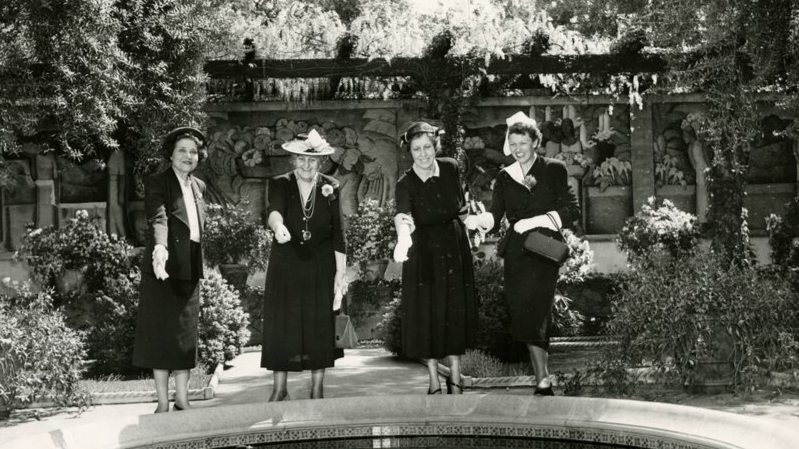
Mary Patterson Routt was a member of the original Board of Trustees of Scripps College. Standing on the far left, Mrs. Routt, is seen here with three other members of the Board (left to right): Mary Kimberly Shirk, Lucille Phillips Morrison, and Professor Louise Hawkes Padelford. Mrs. Routt was also one of just six women to cover the White House during the first administration of President Franklin D. Roosevelt, and was a member of Eleanor Roosevelt’s Press Corps. Photo credit: Claremont College Photo Archive.
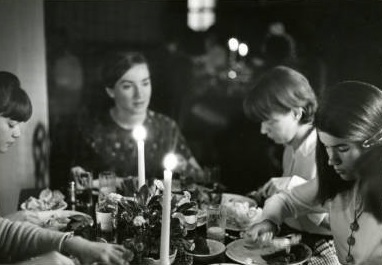
Beginning in fall 1927, Scripps students held traditional Candlelight Dinners in each residence hall along with faculty and staff. The dinners aimed to promote a sense of community and family in each dorm. The tradition fell away in the 1960s and was briefly reinstated with the opening of Malott Commons in the early 2000s. Photo credit: Claremont Colleges Photo Archive.
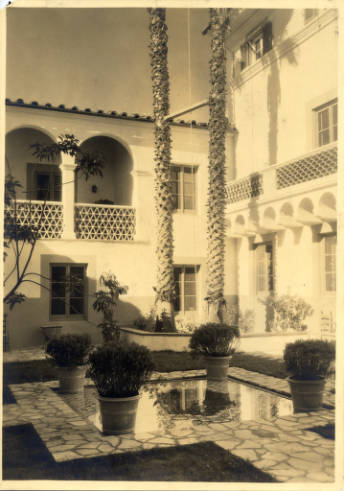
Dedicated in 1927, Star Court in Eleanor Joy Toll Hall was originally named “Palm Court” for two tall palm trees growing in one corner of the courtyard.Photo credit: Claremont Colleges Photo Archive.
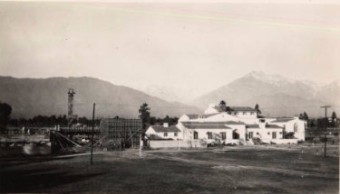
The College’s second residence hall was funded in large part by Ellen Browning Scripps’ niece, who wanted to honor her father and Ellen’s brother, James. Grace Scripps Clark Hall is under construction in the photo above, taken February 1928. Eleanor Joy Toll Hall is seen on the right. Photo credit: Scripps archives.
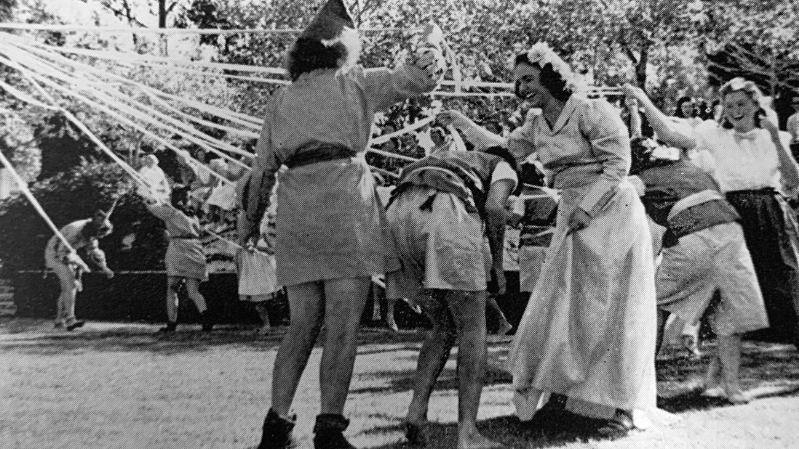
Did you know that on the first Saturday of each May, beginning in 1929, the entire Scripps family gathered on Bowling Green for a festival celebrating first-years, their academic accomplishments, and their place in the community? The Freshman May Fête, as it was called, included crowning the Queen of May and dancing around a maypole. This tradition lasted until at least the early 1970s. More fun facts.
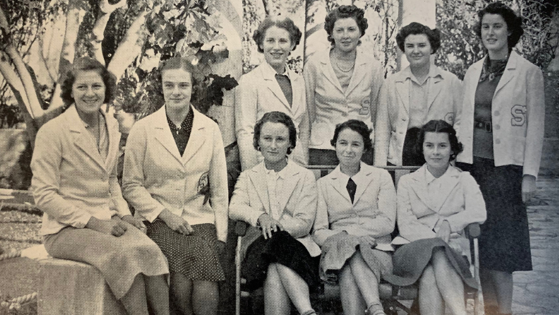
The S Society was established in 1930 originally as an organization for Scripps women who demonstrated outstanding athletic ability, scholarship, and character. The requirements for nomination to join were good sportsmanship, proficiency in at least two sports, and academic achievement. Great secrecy surrounded the selection of new members until the night they were given their white jackets with the block letter “S” at a student body meeting. After much debate, the S Society was dissolved in March of 1943 by majority vote of the student body. Photo credit: Claremont Colleges Photo Archive.
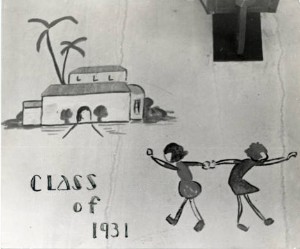
The graffiti wall began with the first graduating class of Scripps College in 1931. Any alum who was not able to sign their class mural as a graduating senior can contact the Alumnae Office and arrange a time to add their name to the wall.
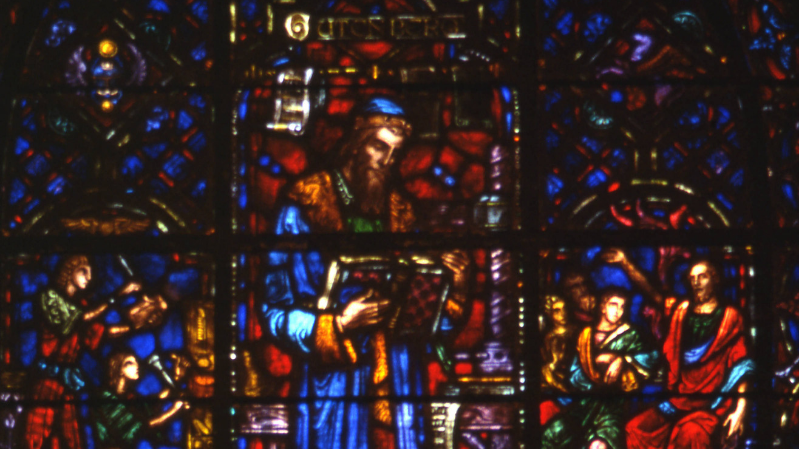
Denison Library opened its doors in 1931. It was designed by Gordon Kaufmann, the College’s original architect. The library was funded by its namesake, Ella Strong Denison, who originally sought to give just a stained-glass window to the structure, but was persuaded to give the building around it, as well. Photo credit: Claremont Colleges Photo Archive.
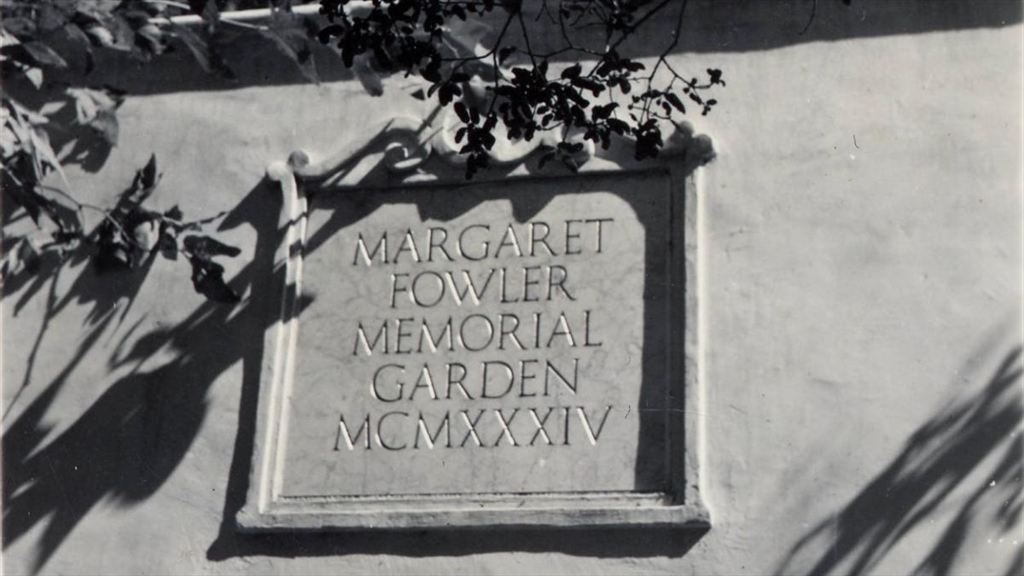
Margaret Fowler was one of the most energetic and dedicated trustees of Scripps College. She was recruited for the Board of Trustees for her work with the YWCA, which took her to France during WWI to assist women war workers. The Margaret Fowler Garden was designed and dedicated in her honor and memory in 1934.Photo credit: Claremont Colleges Photo Archive.

The Jaqua Quadrangle was grassed during the summer of 1936 as a result of students’ “Grass Before We Graduate” campaign. Helen Ely Brill ’36 and Cynthia Criley Williams ’36 developed the slogan in order to aesthetically improve the outdoors common area. Students went without dessert twice a week for two years in order to seed the quadrangle. Photo credit: Scripps archives.
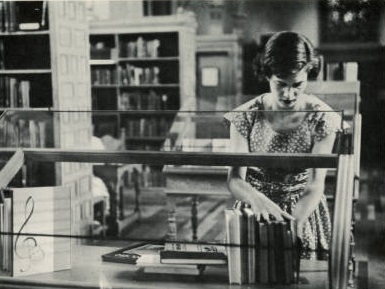
Since 1936,the Slocum Award for best personal library has recognized Scripps seniors whose love for books and collecting has inspired them to build collections on their favorite subjects. The photo above, from the Scripps archives, shows a student arranging her personal book collection to display in Denison Library for the Slocum Award circa 1960.
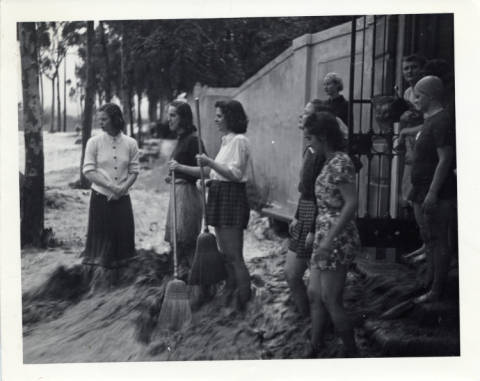
On March 2, 1938, Scripps students experienced a flood of historical proportions, causing significant damage to Grace Scripps Clark and Eleanor Joy Toll Halls. Residents took refuge in Browning and Dorsey Halls, which were unaffected. Soon after, the famous floodwalls were constructed to prevent further water damage. Photo credit: Scripps archives.
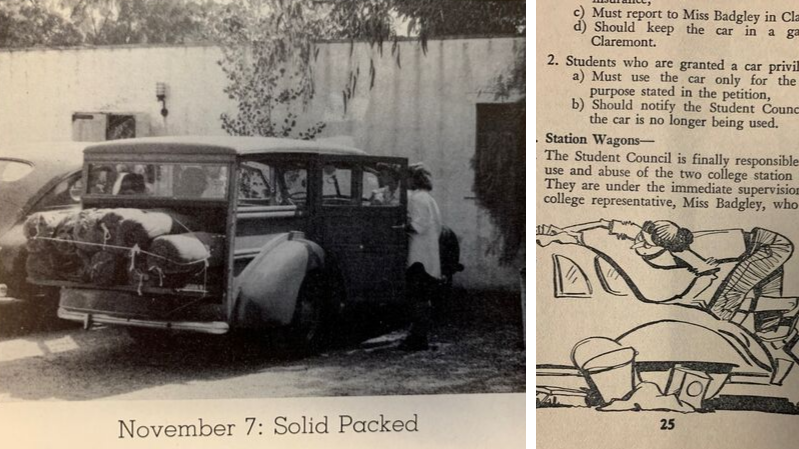
In the 1940s, Scripps had 2 station wagons for students to use, which could hold up to ten passengers. In order for students to have car privileges, they needed to be either a senior, junior, or sophomore in good academic standing, hold a California driver’s license, and have the permission of their parents. Students with car privileges were allowed to use the station wagons to go on day trips or run errands across town—but never overnight, unless it was for a Scripps-sponsored camping trip. There was a six cent per mile charge, which needed to be paid immediately after the trip when returning the car keys to Clark Hall. The minimum charge for any trip was $1.
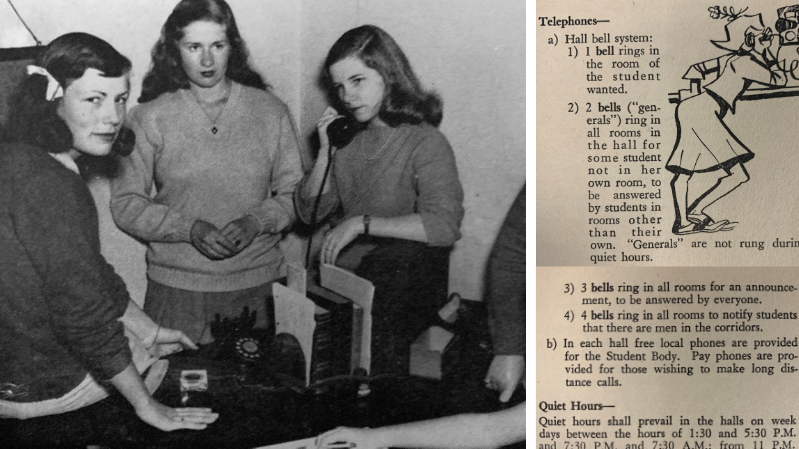
Beginning in the late 1940s, Scripps residence halls had a “Hall Bell System” to reach students: 1 bell rang in the room of the student wanted; 2 bells (“generals”) rang in all rooms in the hall for some student not in her own room, or to be answered by students in rooms other than their own; 3 bells rang in all rooms for an announcement to be answered by everyone; and 4 bells rang in all rooms to notify students that there are men in the corridors.
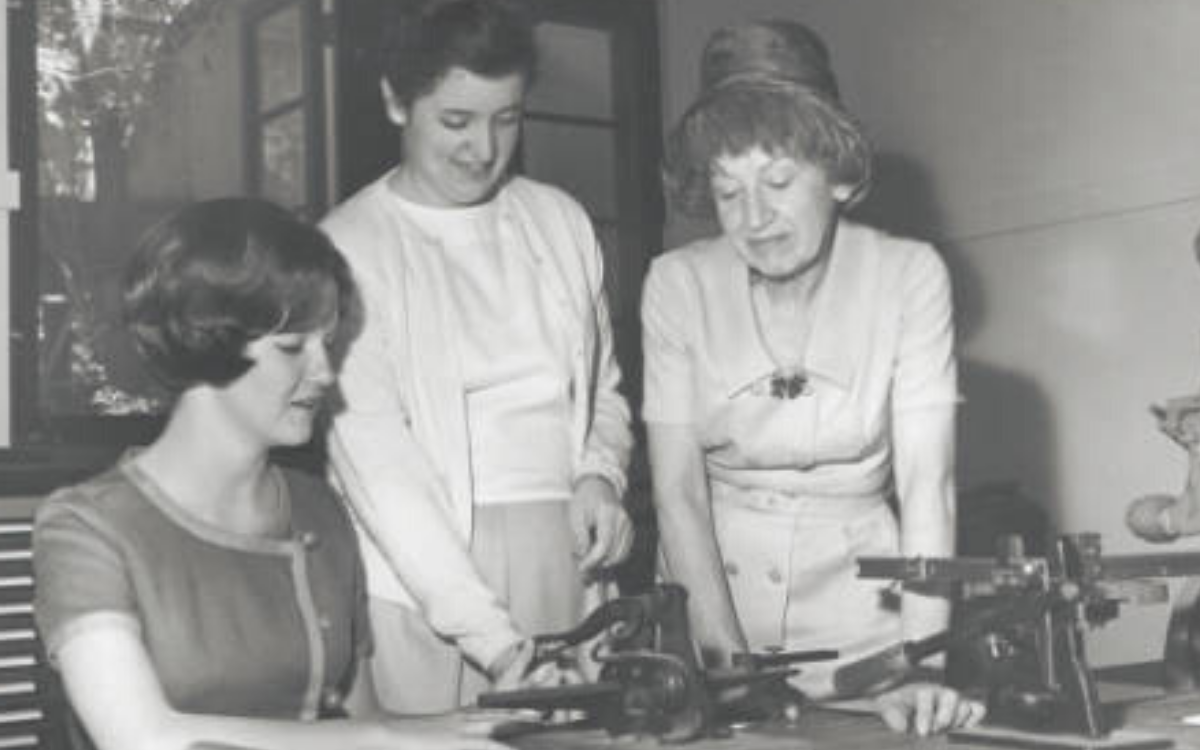
The Scripps College Press first began printing in 1941.That same year, master type designer Frederic W. Goudy designed the “Scripps College Old Style” font for the press. Reserved for more formal College publications, this unique Scripps font is still used today. More fun facts.
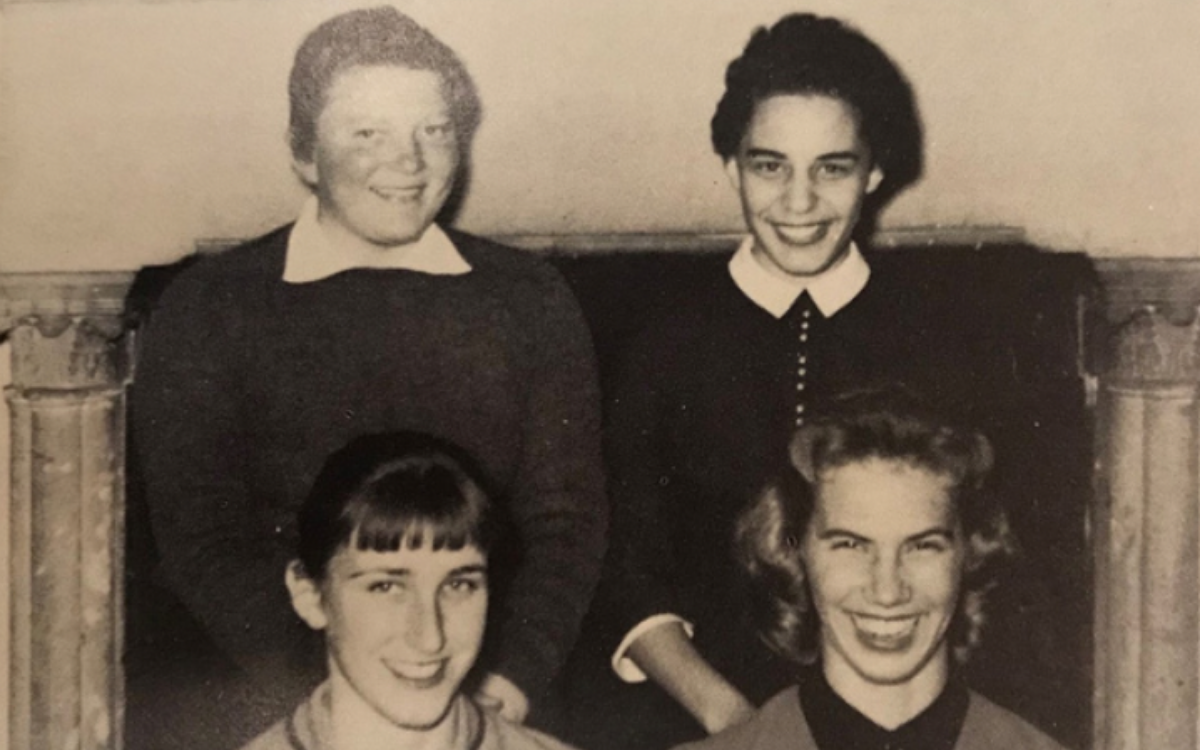
Did you know Adrienne Alma Jones Smith ’62 is believed to be the first Black student to enroll at Scripps College? She enrolled in Fall 1958, lived in Toll Hall, and only attended Scripps for the 1958-1959 academic year, transferring to another college. Adrienne Alma Jones Smith lived in room 5 of Toll Hall and was elected President of her class. The 1959 Scripps College yearbook, La Semeuse, features a photo of the freshman class officers for the 1958-59 academic year, and the photo above shows Adrienne Jones, President, in the upper right corner. Jones is shown with her fellow officers Gayle Weaver ’62, Vice President (upper left), Louise VonWiese ’62, Treasurer (lower left), and Dee Tackett O’Neill ’62, Secretary (lower right). In the same yearbook, the photo of the Toll Hall residents is accompanied by a paragraph in which there is a clear indication of their pride in Adrienne’s role as President for the first-year students and as a member of College Council (today known as Scripps Association of Students). Her election was notable enough that an article appeared on page 13 of the November 13, 1958 issue of Jet magazine, a nationwide publication. Caption and photo credit: Denison Dispatch February 2022 Issue.
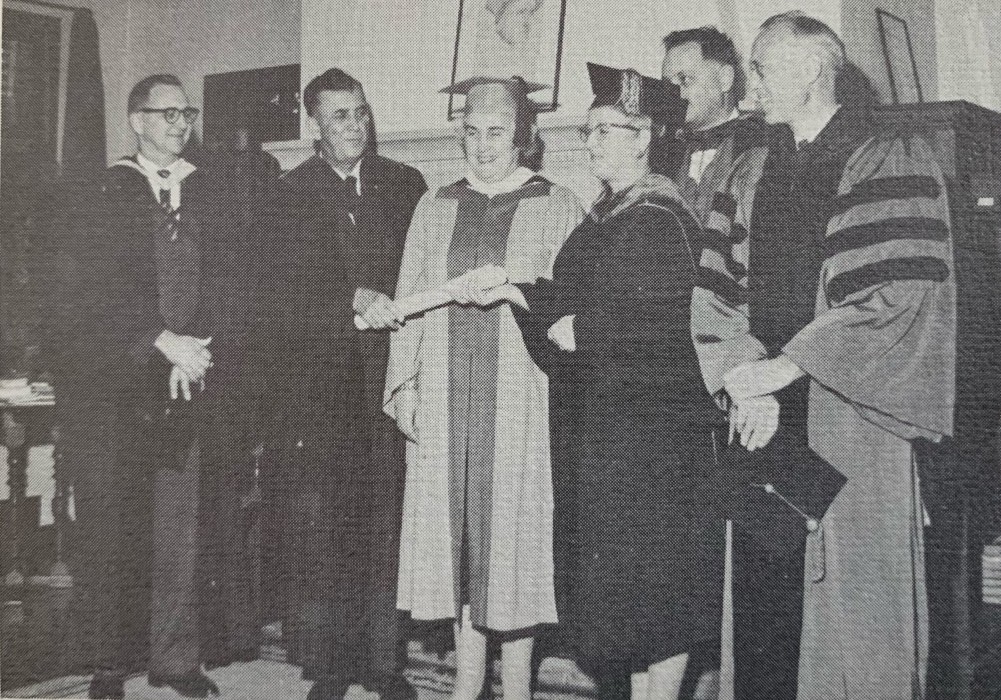
Did you know the Scripps College chapter of Phi Beta Kappa—the Theta of California—was founded in 1961 by Scripps faculty members who themselves had been initiated into the Society as undergraduates. The first Scripps students, Katharine Weston Cohen ’62 and Anne Charlotte Hanes Harvey ’62, were initiated in May 1962. The Phi Beta Kappa Society is the oldest, best known, and most prestigious collegiate academic honor society in the United States. Founded in 1776 at the College of William and Mary in Virginia, Phi Beta Kappa Society has embraced the principles of freedom of inquiry, thought, and expression for over 240 years.
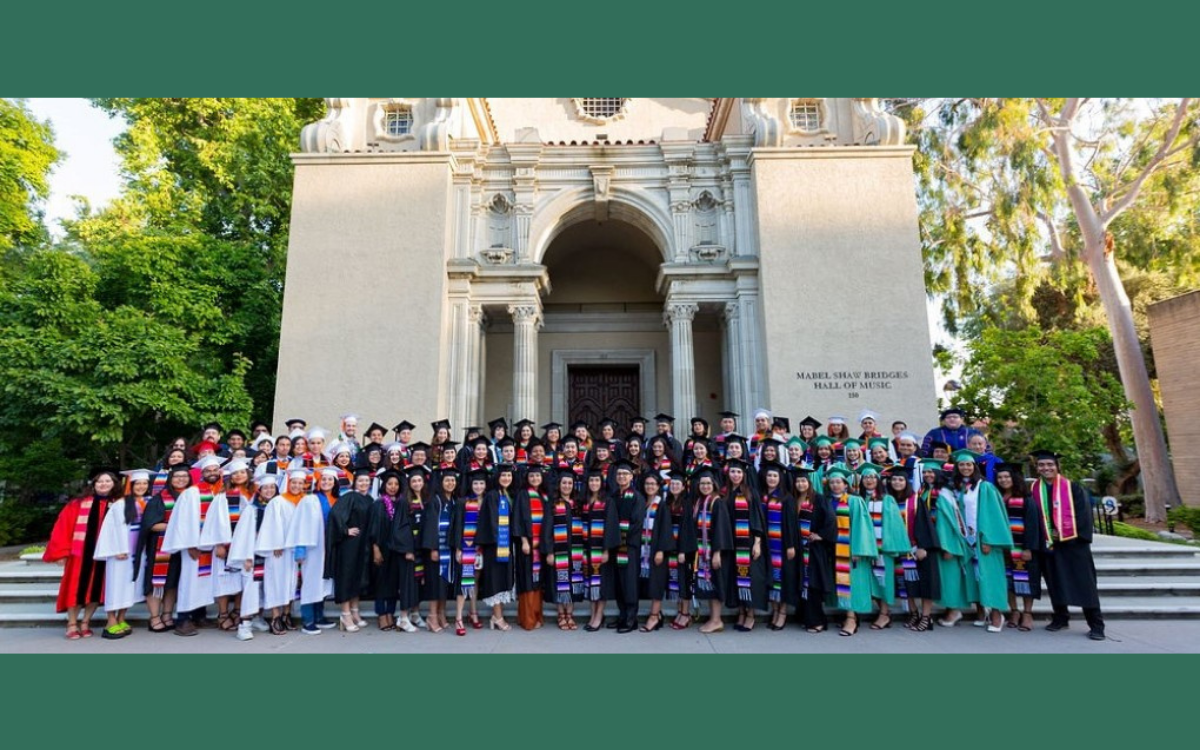
Did you know that in 1969, the Mexican-American Studies Center at the Claremont Colleges was established as a result of the Chicano student movement? The Council of Presidents designated the center as a central program in February 1969 with both an academic and student affairs component. The first director was Ron Lopez who had oversight of faculty and staff. Augustina (Tina) Lopez Snideman was appointed dean of students and was responsible for student programming. The first center was located in a small house on Dartmouth Avenue and 11th Street. In the fall of 1971, the Mexican-American Studies Center became the Chicano Studies Center, led by Ed Quevedo. In the 1970s, there was a significant increase in the enrollment of Chicano students. As the student numbers increased, so did the activities and student programs that the center created. In the summer of 2005, Chicano/Latino Student Affairs (CLSA) moved to its current location on the second floor of the Tranquada Student Services Center. Photo and caption credit: Chicano Latino Student Affairs. More Scripps facts.
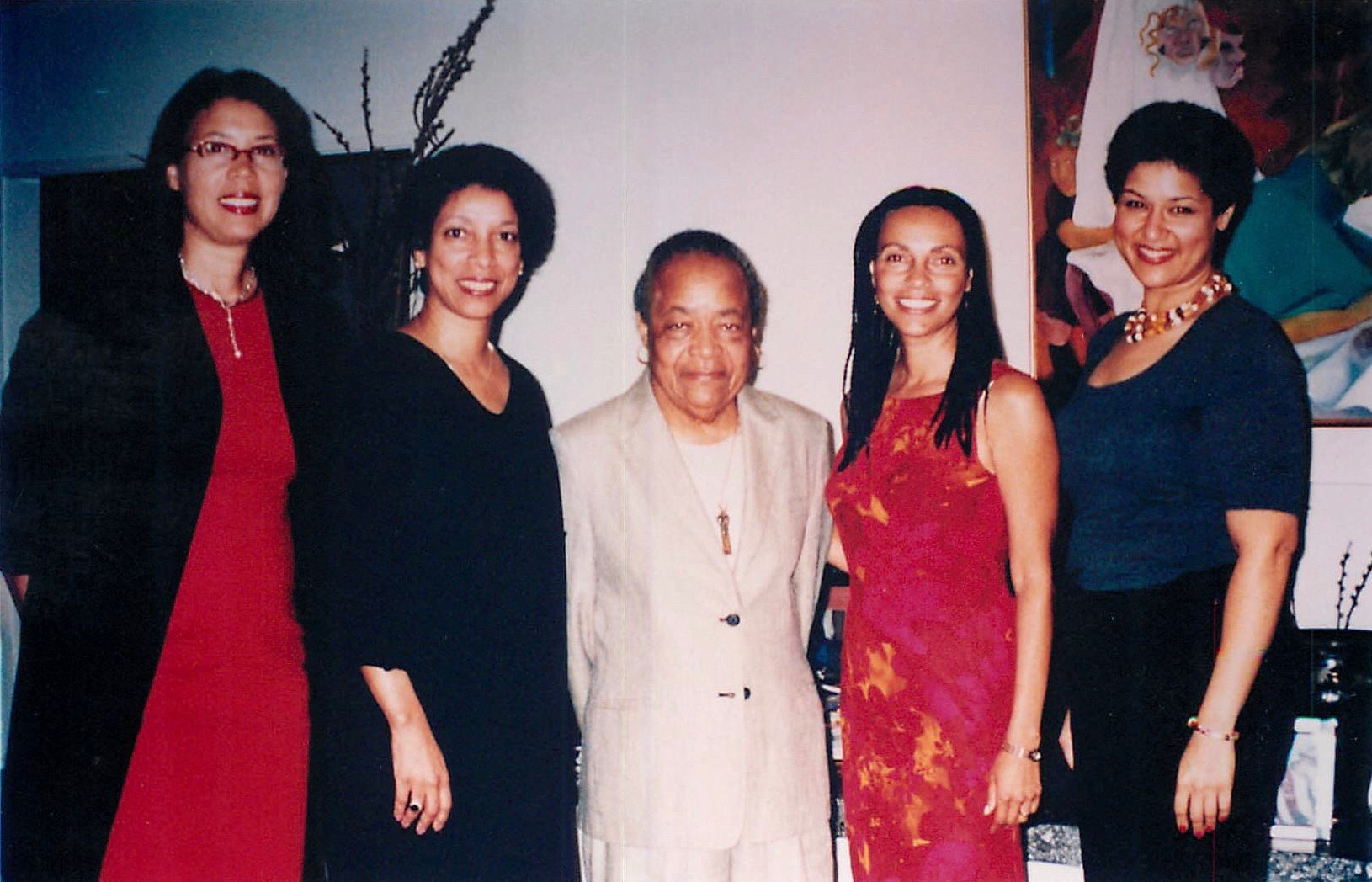
Did you know that from 1969 to 1984, Samella Lewis taught at Scripps College, becoming its first tenured African American professor? Scripps College Professor Emerita of Art Samella Lewis has garnered a staggering array of firsts: She is the first African American in the United States to earn a doctorate in fine art and art history, the first founder of an African American-owned art publishing house, the first author of a textbook on African American art history, and much more. In her honor, the Samella Lewis Scholarship was established in 2002, annually recognizing an African American Scripps student who demonstrates excellence in scholastic achievement, character, leadership, and responsibility. Photo: Scripps Professor Emerita of Art Samella Lewis (center) in 2002 with Rochelle Branch, Cultural Affairs Manager at City of Pasadena; Lynne Thompson ’72, Scripps Board Chair; Denise Nelson Nash ’76, Scripps Vice President and Secretary of the Board of Trustees; and Crystal Jones ’85, Scripps Director of Development. Photo & caption credit: Emily Glory Peters.
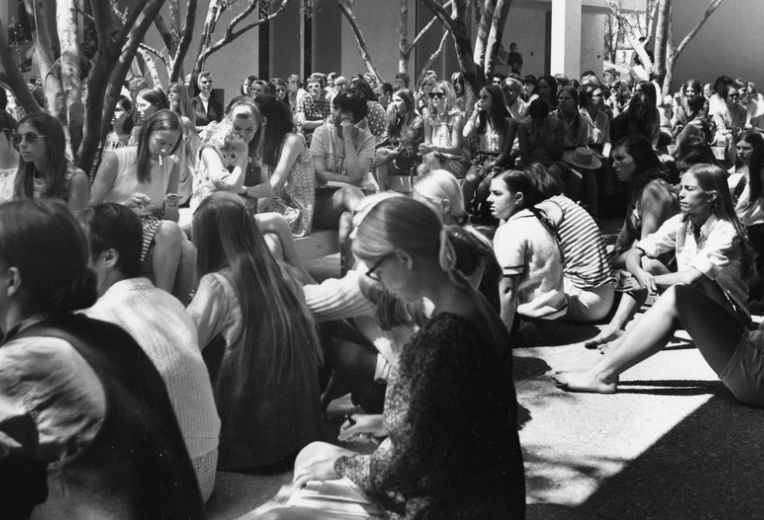
Classes were cancelled and some campus offices were closed on Thursday, May 7, 1970, when the Scripps community voted to spend the day participating in discussions about the Vietnam War and the deaths of four Kent State College students that occurred just three days beforehand. Students gathered in the Humanities Courtyard, where they voted on various resolutions and initiated the start of a letter writing campaign to government representatives, including President Richard Nixon.
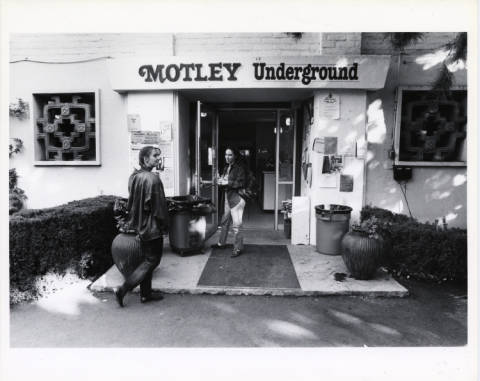
Before the Motley Coffeehouse moved to its current Seal Court location, it started in Balch Hall, then relocated to the vacant studios of the Lang Art building (now the conference rooms of Malott Commons)––with even a brief stint in the former Frankel Hall exercise room. Regardless of location, the student-run coffeehouse has served as a beloved destination for caffeine and community. Photo credit: Claremont Colleges Photo Archive.
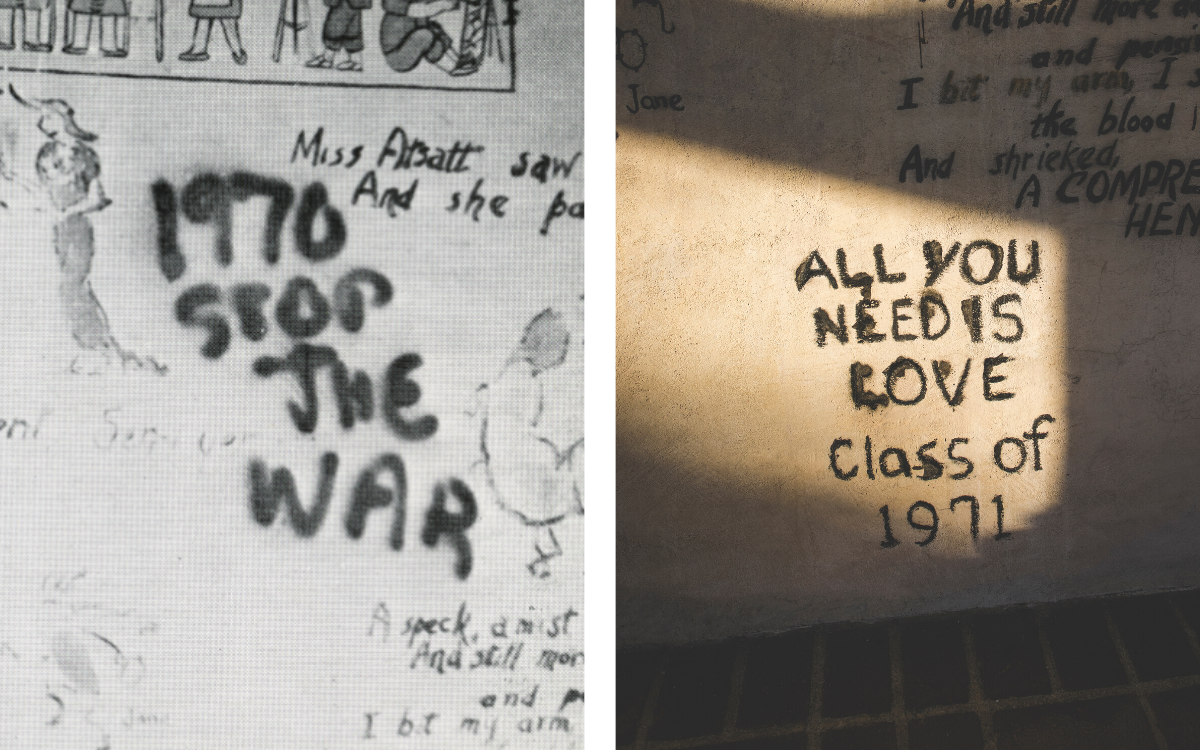
There are only a few classes that do not have murals on the graffiti wall. The Class of 1972 was reluctant to participate in painting a class mural on the wall because many members felt it was irrelevant, given the times. The Vietnam War, social unrest, and political upheaval were deemed far more important. Now, the Class of ’72 plans on finally adding their mural to commemorate their 50th reunion.

Did you know that on March 5, 2003, a large contingent of Scripps students gathered on the Pomona campus with other Claremont Colleges students for a peace rally? Students wearing peace symbols and carrying signs spent hours in the sun chanting and singing. The Motley, the student-run coffeehouse, closed for the day, sharing “not business as usual.” Two days earlier, the Classics Department at Scripps had presented Lysistrata, a Greek comedy written by Aristophanes as a “theatrical act of dissent.” During spring break, students from the Claremont Colleges, including several from Scripps using their own funds, flew to Washington, D.C., to protest the war against Iraq. Photo and caption credit: Scripps magazine Spring 2003. More Scripps facts.
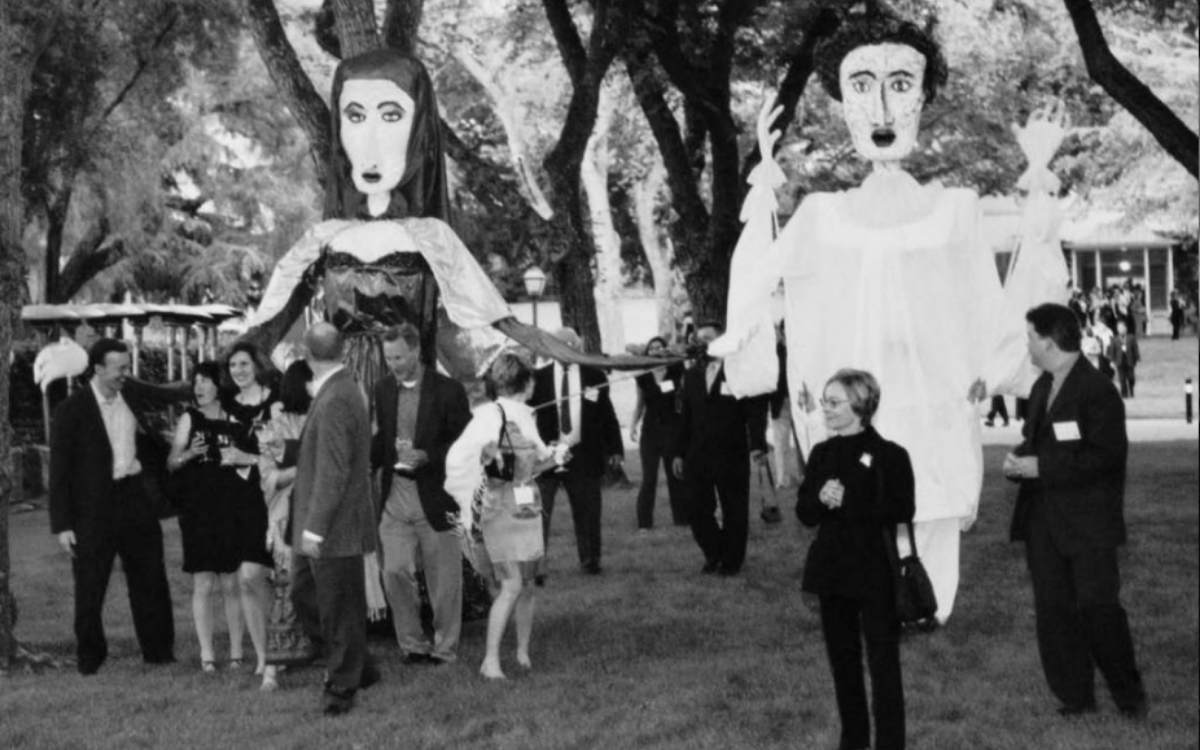
Did you know that puppet people as tall as the lower elm tree branches loomed over Scripps’ 75th Anniversary guests as they led them from a reception at Revelle House to dinner and dancing on Bowling Green Lawn? Right from the start, the tone was set for merrymaking as more than 450 alumnae, parents, friends, and members of the Scripps community celebrated the conclusion of Scripps’ 75th Anniversary year. More Scripps facts. Photo & caption credit: Scripps Magazine Spring 2002.
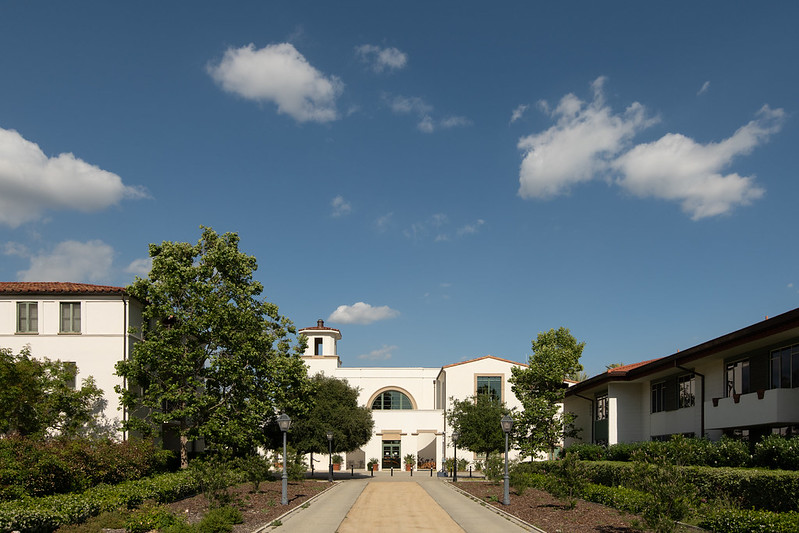
Did you know the field house was named after Sallie Tiernan ’45? A devoted Scripps alumna and trustee, Sallie Tiernan ’45, was a stunning example of what it means to be a Scripps alum. Throughout her life, Tiernan valued the importance of education for women and gave back to the College through her many philanthropic activities and as the first woman chair of the Scripps Board of Trustees. More Scripps facts.

Did you know that Sarah Williams ’15 was one of 22 Americans who participated in the Buckingham leg of the historic relay that lead into the opening ceremonies for the London 2012 Summer Olympic Games? Williams was selected for her volunteer work and for a project she started to provide blankets for foster children

Did you know that Scripps College has been part of four films? In 2019, Bliss (2021) brought Salma Hayek, Owen Wilson, and Bill Nye to film at various parts of campus. For the Netflix film Bird Box (2018), Scripps courtyards can be seen transformed into the film’s fictional Janet Tucker School. City of Gold (2015) also has credited Scripps College for being a filming location. Lastly, in the film Beaches (1988), Denison Library is where Barbara Hershey did her research. More Scripps facts.


